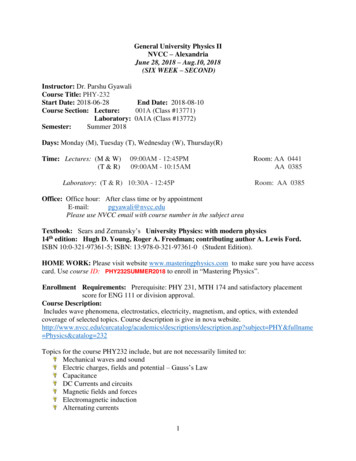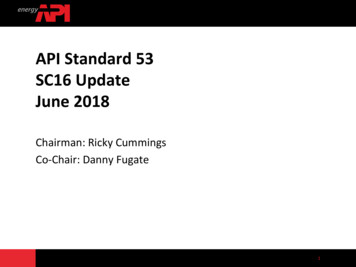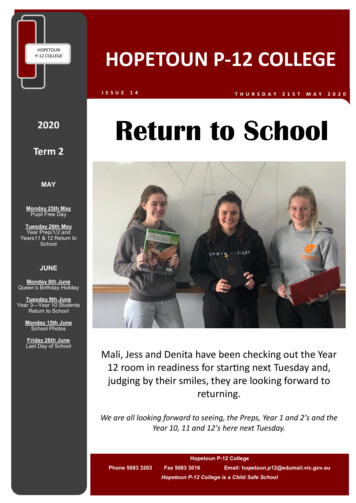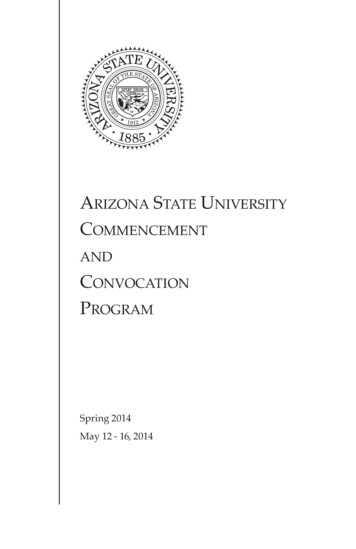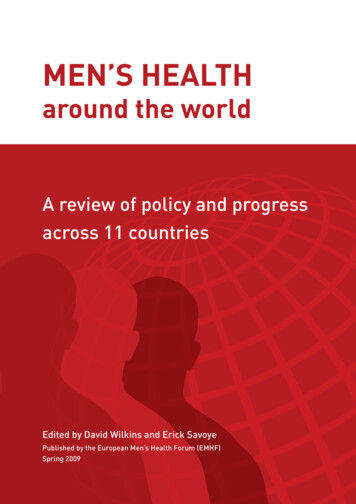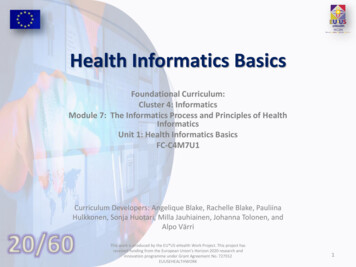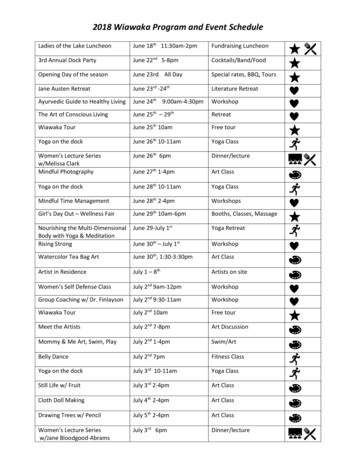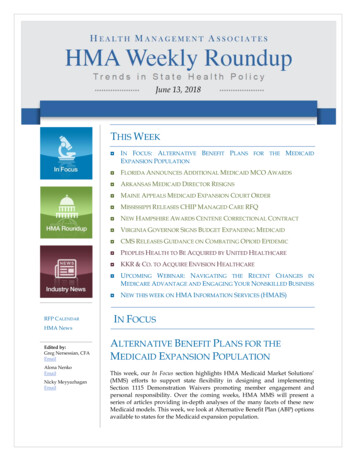
Transcription
June 13, 2018THIS WEEKRFP CALENDARHMA NewsEdited by:Greg Nersessian, CFAEmailAlona NenkoEmailNicky MeyyazhaganEmail IN FOCUS: ALTERNATIVE BENEFIT PLANS FOR THE MEDICAIDEXPANSION POPULATION FLORIDA ANNOUNCES ADDITIONAL MEDICAID MCO AWARDS ARKANSAS MEDICAID DIRECTOR RESIGNS MAINE APPEALS MEDICAID EXPANSION COURT ORDER MISSISSIPPI RELEASES CHIP MANAGED CARE RFQ NEW HAMPSHIRE AWARDS CENTENE CORRECTIONAL CONTRACT VIRGINIA GOVERNOR SIGNS BUDGET EXPANDING MEDICAID CMS RELEASES GUIDANCE ON COMBATING OPIOID EPIDEMIC PEOPLES HEALTH TO BE ACQUIRED BY UNITED HEALTHCARE KKR & CO. TO ACQUIRE ENVISION HEALTHCARE UPCOMING WEBINAR: NAVIGATING THE RECENT CHANGES INMEDICARE ADVANTAGE AND ENGAGING YOUR NONSKILLED BUSINESS NEW THIS WEEK ON HMA INFORMATION SERVICES (HMAIS)IN FOCUSALTERNATIVE BENEFIT PLANS FOR THEMEDICAID EXPANSION POPULATIONThis week, our In Focus section highlights HMA Medicaid Market Solutions’(MMS) efforts to support state flexibility in designing and implementingSection 1115 Demonstration Waivers promoting member engagement andpersonal responsibility. Over the coming weeks, HMA MMS will present aseries of articles providing in-depth analyses of the many facets of these newMedicaid models. This week, we look at Alternative Benefit Plan (ABP) optionsavailable to states for the Medicaid expansion population.
June 13, 2018Health benefits offered to the expansion population are required to beprovided through an ABP. States may elect to align these benefits with theMedicaid State Plan or may choose to base them on a different set of benefits.ABPs were an option for states prior to the Affordable Care Act and wereupdated following its passage to reference the Essential Health Benefits (EHB)options that are available to states in the commercial market while maintainingthe exemption for the medically frail.To date, 34 states, including Washington D.C., have elected to offer Medicaidto childless adults with income under 138% of the poverty level. Among thesestates, 14 have implemented or are in the processing of implementing theoption to base the benefits for the expansion population on a package otherthan the Medicaid State Plan. Unlike other personal responsibility initiativestargeted at the expansion population, ABPs can be structured without theimplementation of a Section 1115 waiver. In addition, the recently finalized(April 17, 2018) Notice of Benefit and Payment Parameters for 2019 will allowstates additional flexibility in selecting EHB benchmarks beginning in 2020.This flexibility will carry over to ABPs, providing more options on which statescan base their Medicaid expansion coverage.Current ABP OptionsStates developing benefit packages targeted to Medicaid expansion adults havethe option to develop a benchmark or benchmark equivalent coverage ABP. Abenchmark plan is a benefit design that is indexed to the benefits offered on areference plan, and a benchmark equivalent plan is a benefit design thatprovides benefits of equivalent value to a reference plan. Many of therequirements for ABPs are linked to the commercial market definition of EHB.Benchmark coverage must offer benefits in the ten EHB categories 1 and offerbenefits of equal value to those in the benchmark plan. “Equal to” does notindicate that the same benefits must be offered, as benefits may be removed orsubstituted within an EHB category following the methodology for benefitsubstitution available in the commercial market. Plans that can serve as thebase-benchmark include all of those plans available to serve as commercialmarket EHBs.21Includes: ambulatory patient services (outpatient services), emergencyservices, hospitalization (inpatient), maternity and newborn care, mentalhealth and substance use disorder services, including behavioral healthtreatment, prescription drugs, rehabilitative and habilitative services (thosethat help patients acquire, maintain, or improve skills necessary for dailyfunctioning) and devices, laboratory services, preventive and wellness servicesand chronic disease management, pediatric services, including oral and visioncare. Note: For the purposes of offering benefits to the adult population inMedicaid, Early Periodic Screening Diagnostic, and Treatment services do notapply as these are a required pediatric benefit.2Includes: Federal Employee Coverage (Blue Cross Blue Shield PPO), StateEmployee Coverage, Largest Commercial Non-Medicaid HMO by enrollmentin the State, Secretary Approved Coverage (Medicaid State Plan) AND all ofthe options available in the state for the commercial market EHB,encompassing the three small group insurance plans by enrollment in thestate).PAGE 2
June 13, 2018The benchmarking process for ABPs contains more flexibility than allowed forthe definition of a state’s EHB in the commercial market. Within the tenrequired benefit categories, benefits may be removed, replaced, modified, andsubstituted, provided that the entire actuarial value of the category does notfall below the original value in the reference plan. Any EHB category may beduplicated from the Medicaid State Plan, provided it is of at least the samevalue, while continuing to base the remaining EHB categories on the selectedbenchmark plan. In addition, benefits may be added to the ABP that are notincluded in the benchmark option, without the requirements that the cost ofthe benefit be defrayed as exists in the commercial market.States may also leverage benchmark equivalent coverage when targetingbenefits that require more flexibility than allowed under the benchmarkprocess. Benchmark equivalent coverage requires the same coverage of the tenEHB categories but allows for a package that is on aggregate of equal value toone of the benchmark options instead of equal value in every category.Prescription drugs, mental health, vision and hearing services must beprovided at least at 75 percent of the actuarial value of the benchmark plan.However, provided the total value of the plan is at least equal to the referenceplan, there are no such restrictions on variation in the other categories underthe benchmark equivalent option.Future ABP OptionsThe Notice of Benefit and Payment Parameters for 2019 adds benchmarkoptions for states to leverage from the commercial market in 2020. As the ABPbenchmark plan options are based on those plans available in the commercialmarket, this will allow for additional flexibility for states in defining benefitpackages via ABPs beginning in 2020. The requirement to offer all 10 EHBbenefit categories and the existing benchmark options remain. Additionalbenchmark plan options include: The EHB benchmark plan for 2017 from any state Any of the existing benchmarks, with any EHB category replacedby a benchmark plan from another state Otherwise selecting or developing a benchmark, provided it isequivalent to a typical employer plan.3This increased flexibility will allow for further targeting and development ofinnovative benefit designs in Medicaid.3Defined as equal to one of the existing benchmark options, one of the fivelargest benchmarks by enrollment for large group health insurer plans.PAGE 3
June 13, 2018State Examples of Benefit Variation via ABPsIdentifying and Enrolling the Medically FrailStates utilizing an ABP distinct from the Medicaid State Plan must also identifymedically frail expansion beneficiaries and offer these individuals theopportunity to select the Medicaid State Plan.4 In states where the ABP is thestate plan, the medically frail identification and opt-out process is not required.In states with community engagement requirements, however, identification ofmedically frail expansion beneficiaries is required (even where there is not abenefit difference) since they are exempt from those requirements.The federal definition of medically frail as applicable to the MedicaidExpansion population includes: individuals with disabling mental disordersindividuals with chronic substance use disordersindividuals with serious and complex medical conditions;individuals with a physical, intellectual or developmental disabilitythat significantly impairs their ability to perform one or more activitiesof daily living, andindividuals with a disability determination based on Social Securitycriteria or in states that apply more restrictive criteria than theSupplemental Security Income program, the state plan criteria.4Since enrollment of the newly eligible adult or Medicaid expansionpopulation is required to be into ABPs, CMS refers to the Medicaid State Planoption as ‘the ABP that is the state plan’ for medically frail individuals.PAGE 4
June 13, 2018Within these criteria, states have substantial flexibility in how they define themedically frail and what process they leverage to identify them. Statedefinitions of medically frail may be based on diagnosis codes, past health careutilization, or general member medical need. Once medically frail is defined,the state must develop a method to identify medically frail individuals. Thismay include member screening tools or surveys, provider attestations and/ordocumentation, or tools that perform claims analysis to identify individualsthat meet the state’s criteria.For individuals determined to be medically frail, these individuals may beenrolled by default into the Medicaid State Plan option and then provided, ifrequired, the opportunity to change to the ABP option. Providing theopportunity to change coverage options requires that the state inform theenrollee of the difference in benefits between the two options.Example of State Variations in Medically Frail ProcessesOutlook for ABPsLeveraging the options to target benefit design, specifically to the Medicaidexpansion population, provides the ability to develop benefits appropriate tothe needs of the target population. Analyzing the benchmark plan options toselect the most appropriate benefit starting point, and developing medicallyfrail definitions and methodology are key considerations when implementingtargeted benefits for the Medicaid expansion. In addition, where benefits varybetween populations, ensuring transparency for members, providers and otherstakeholders regarding what benefits are covered is a critical factor to success.PAGE 5
June 13, 2018ArkansasArkansas Medicaid Director to Resign. The Northwest Arkansas DemocratGazette reported on June 12, 2018, that Rose Murray Naff will resign herposition as director of the Arkansas Medical Services Division effective July 13.Naff has served in the post for 11 months. Deputy director Tami Harlan willserve as interim director. Read MoreColoradoColorado Releases RFI for Non-Risk Medicaid, CHIP Dental Services.Colorado, on June 12, 2018, released a Request for Information for a single,non-risk dental managed care contract for the state’s Medicaid program andChildren’s Health Insurance Program (CHIP). The state currently has a riskcontract with Colorado Dental Service, Inc., for CHIP and an administrativeservices organization contract with DentaQuest for Medicaid. Responses aredue July 12, 2018.FloridaFlorida Announces Additional Medicaid Managed Care Awards. On June 12,2018, the Florida Agency for Health Care Administration announcedadditional awards for the Statewide Medicaid Managed Care Program,Regions 3-7 and 9-11. All plans are Managed Medical Assistance (MMA) Planswith the exception of Simply Healthcare in Region 10, which is aComprehensive Plan.Region 3: UnitedHealthcare of Florida, Inc.Region 4: UnitedHealthcare of Florida, Inc.Region 5: Simply Healthcare Plans, Inc. (Anthem)Region 6: Coventry Health Care of Florida, Inc. D/B/A Aetna Better Health ofFloridaRegion 7: Coventry Health Care of Florida, Inc. D/B/A Aetna Better Health ofFloridaRegion 9: Florida True Health, Inc. D/B/A Prestige Health ChoiceRegion 10: Simply Healthcare Plans, Inc.Region 11: Florida True Health, Inc. D/B/A Prestige Health Choice. ReadMorePAGE 6
June 13, 2018Florida Program Cuts Increase Scrutiny on Prison Health Contract. The PalmBeach Post reported on June 8, 2018, that Florida’s recent cuts to drug treatment,mental health and community re-entry programs in the state have increasedstakeholder scrutiny on the Centurion’s prison health services contract.Centurion of Florida, which was the only company that agreed to negotiatewith the state, administers a 375 million prison health care contract thatallows for an 11.5 percent administrative fee. Centurion first began treating97,000 inmates in the Florida Corrections system two years ago. The contract isset to take effect July 1. Read MoreFlorida CHIP Costs to Rise as ACA Match Decreases. Health NewsFlorida reported on June 7, 2018, that Florida’s share of costs for the Children’sHealth Insurance Program (CHIP) are expected to rise as federal matchingfunds drop to 84 percent in 2020 and 72 percent in 2021. Florida costs areprojected to be about 75 million in 2020, according to a report by GeorgetownUniversity’s Center for Children and Families. Read MoreFlorida to Face Legal Challenge from Molina Healthcare Over MedicaidContracts. Health News Florida reported on June 7, 2018, that Molina Healthcareannounced plans to challenge the Florida Agency for Health CareAdministration’s decision last week to award additional Medicaid contracts toMiami Children’s Health and Lighthouse Health Plan. In April, the agencyannounced five-year awards to nine managed care plans in 11 regions, worthmore than 90 billion. Molina has 10 days to file a legal petition with thestate. Read MoreIowaIowa to Cap Adult Medicaid Dental Wellness Plan Benefits at 1000 PMPY.The Gazette reported on June 11, 2018, that Iowa intends to cap benefits in itsMedicaid Dental Wellness Plan at 1,000 per member per year for beneficiariesover 21 effective July 1. The Iowa Department of Human Services is acceptingpublic comments through June 29. The limit doesn’t include annual checkups,cleanings, X-rays, fluoride treatments, and other preventive, diagnostic oremergency dental services. The Dental Wellness Plan is a Medicaid managedcare program with coverage contracted out to Delta Dental and MCNADental. Read MoreIowa Auditor to Examine Medicaid Managed Care Savings Projections. TheDes Moines Register reported on June 8, 2018, that Iowa auditor Mary Mosimanwill investigate why the state Department of Human Services tripled itsMedicaid managed care savings projection to 140.9 million annually. Theaudit was requested by Iowa Senator Pam Jochum (D-Dubuque), a critic ofmanaged care, who believes savings will come from cuts to services andshorted payments. Read MorePAGE 7
June 13, 2018KentuckyKentucky Opponents of Medicaid Work Requirements to Get Day inFederal Court. WKMS reported on June 12, 2018, that a U.S. District CourtJudge in Washington, DC, will hear arguments in a lawsuit filed by 16Kentucky Medicaid beneficiaries challenging the state’s plan to implementMedicaid work requirements. A decision could come as soon as this week.Kentucky was the first state to receive approval for a waiver to implementwork requirements, which are scheduled to roll out beginning July 1 on acounty-by-county basis. Read MoreMaineMaine Appeals Medicaid Expansion Court Order. The Seattle Times reportedon June 7, 2018, that Maine Governor Paul LePage continues to opposeimplementation of the state’s voter-approved Medicaid expansion, with hisadministration appealing a recent court order to carry out the law. Aspreviously reported, Maine Superior Court Justice Michaela Murphy orderedLePage to submit a plan for implementation within a week. The LePageadministration previously missed an April deadline to submit a plan and wassued by advocates. Read MoreMichiganMichigan Medicaid Work Requirement Bill Includes Provision That CouldEnd Expansion. The Detroit Free Press reported on June 8, 2018, that a MichiganMedicaid work requirements bill includes a provision that could end thestate’s Medicaid expansion program altogether. Under the bill, Michiganwould need to apply for a waiver that limits expansion benefits to 48 months.If recipients exceed that time, they will need to pay 5 percent of their incomeand prove they are practicing healthy behaviors. If the federal governmentdoes not approve the waiver within 12 months, expansion would end.Governor Rick Snyder is expected to sign the bill, which has already passed thestate House and Senate. Read MoreHouse Passes Medicaid Work Requirement Bill. Crain’s DetroitBusiness reported on June 6, 2018, that the Michigan House passed a revisedwork requirements bill for the state’s Medicaid expansion population. Underthe bill, beneficiaries aged 18-64 would need 80 hours of work, school, jobtraining, internship, substance abuse treatment, or community servicemonthly. A prior version of the bill would have applied to all adults onMedicaid. Approximately 27,000 to 54,000 could lose coverage because of therequirement. Read MoreMichigan Medicaid Hepatitis C Treatment Would Expand Under Settlement.The Associated Press reported on June 6, 2018, that a federal judge has givenpreliminary approval to a settlement that would result in expanded access tohepatitis C treatment to all Michigan Medicaid beneficiaries effective fall 2019.A lawsuit had claimed that Michigan was limiting new antiviral medicine onlyto the most severe hepatitis C cases. A fairness hearing for final approval of thesettlement is set for August 8. Read MorePAGE 8
June 13, 2018MinnesotaDental Association Renews Campaign to Raise Medicaid ReimbursementRates. The Minnesota Dental Association said it has renewed a public affairscampaign on June 11, 2018, to increase support for higher Medicaidreimbursement rates for dental services, especially for children. Minnesotaranks 49th out of the 50 states for pediatric Medicaid dental reimbursementrates. Read MoreMississippiMississippi Releases CHIP Managed Care RFQ; Letters of Intent Due June29. The Mississippi Division of Medicaid on June 8, 2018, released a Children’sHealth Insurance Program (CHIP) request for qualifications (RFQ). Biddingmanaged care organizations (MCOs) must submit letters of intent by June 29,2018. Proposals will be due July 27, 2018, and contracts will be effective July 1,2019 through June 30, 2022, with two optional years. The Mississippi CHIPProgram operates statewide. UnitedHealthcare and Magnolia Health Plan arethe incumbent plans. The current contracts expire on June 30, 2019. Mississippidid not state how many new contracts will be awarded. Read MoreMontanaNursing Homes, Assisted Living Facilities File Lawsuit to Stop MedicaidCuts. The News & Observer/Associated Press reported on June 11, 2018, that theMontana Health Care Association and six other nursing homes and assistedliving facilities filed a lawsuit against the Montana Department of PublicHealth and Human Services to stop cuts to Medicaid reimbursements. The 2.99percent cut is expected to extend through the next fiscal year beginning on July1. Read MoreNew HampshireNew Hampshire Awards Centene Correctional Healthcare Contract. Centeneannounced on June 12, 2018, that the New Hampshire Department ofCorrections has awarded its Centurion subsidiary the state’s correctionalhealth care contract, effective July 1, 2018, for four years, plus two optionalyears. Centurion is the incumbent vendor. Read MorePAGE 9
June 13, 2018New JerseyHMA Roundup – Karen Brodsky (Email Karen)Department of Health Annual Summit Addresses Opioid AddictionThrough Population Health. NJ Spotlight reported on June 6, 2018, that theNew Jersey Department of Health held its third annual population healthsummit on June 5, 2018, which made opioid addiction a centerpiece. Speakersstressed the need to address prevention and wellness through populationhealth in efforts to combat the opioid epidemic. More than 2,000 New Jerseyresidents died of drug-related problems in 2017 and the number of statenewborns born with addictions has doubled in recent years. The followingmap from the Department of Health shows the distribution of opioid relateddeaths in New Jersey in 2016. Read more.New Jersey DSRIP Program Offers Behavioral Health MeasurementGuidance. The New Jersey Department of Health conducted a webinar onJune 4, 2018, for DSRIP participants to introduce DSRIP Years 7 to 8 Stage 1measure guidance for behavioral health. Specifically, the guidance addressesscreenings and appropriate follow-up for potential substance use disorder anddepression by primary care and behavioral health providers. The stateintroduced this new measure to improve hospitals’ ability to know whetherthey are screening their population, the burden on the population and to trackwhether providers are documenting guideline-based follow-up plans whensomeone screens positive. The measure is further described below. Thewebinar slides and a link to watch the webinar presentation can be found here.PAGE 10
June 13, 2018New YorkHMA Roundup – Denise Soffel (Email Denise)Insurers Propose 2019 Health Insurance Rates in Individual Market. Healthinsurers in New York have submitted rate requests for 2019. Under NewYork’s prior approval law, rates have to be approved by the Department ofFinancial Services (DFS), which typically reduces rate increase requests. DFSreviews all of the submissions to ensure that rate increases are fully andactuarially justified by appropriate medical cost increases and are notinadequate, excessive or unfairly discriminatory, in accordance with New Yorklaw. In the individual market, rate increase requests averaged 24 percent,ranging from a high of 38.6 percent (Fidelis) to a rate decrease of 3.2 percent(HealthNow, serving the Buffalo area). Fidelis, which currently has the lowestpremiums in the state, is being acquired by Centene Corporation. Theindividual market in New York insures 317,000 people; Fidelis currently has 32percent of the market.The rate increase requests separate out a specific percentage of the increasethat they attribute to the repeal of the individual mandate penalty, whichrequired most Americans to buy coverage or pay a tax penalty. The individualmandate, a key component of the Affordable Care Act, helped mitigate againstdramatic price increases by ensuring healthier insurance pools. Insurers haveattributed approximately half of their requested rate increases to the risks theysee resulting from its repeal. Read MorePAGE 11
June 13, 2018INDIVIDUAL MARKETCompany NameCDPHP*2019 RequestedRate Changewithout theIndividualMandate RepealAdditionalPercentageTotal 2019Associated with the Requested RateIndividualChangeMandate Repeal5.1%0.0%5.1%Crystal Run Health Plan, LLC12.0%3.7%15.7%Emblem*19.5%12.0%31.5%Empire Healthchoice %Healthfirst Insurance Company, Inc.8.5%6.5%15.0%Healthfirst PHSP, Inc.*8.5%6.5%15.0%Healthnow New %4.7%6.5%Oscar*17.0%8.2%25.2%UnitedHealthcare of New York Inc*17.7%5.9%23.6%Weighted averages:12.1%11.9%24.0%Excellus*Fidelis (New York Quality HealthcareCorp)*IHBC*MetroPlus*MVP Health Plan** Indicates the Company offers products on the NY State of HealthMarketplace.Health and Recovery Plans Now Offered Through New York State ofHealth. Individuals eligible to enroll in Health and Recovery Plans (HARPs),designed for individuals with serious mental illness and/or substance usedisorders, will now have the option to select a HARP on New York State’sofficial health plan marketplace, New York State of Health (NYSOH). HARPeligible individuals will be automatically moved into the HARP associatedwith their current health plan. Before enrollment, they will receive anotification letter about this move. HARP-eligible individuals wishing to optout of a HARP will need to opt out within 30 days after receiving theirnotification letter to avoid being automatically moved.PAGE 12
June 13, 2018Academy of Medicine Announces its Annual Albany Update. The New YorkAcademy of Medicine hosts an annual session on the status of health reformefforts in Albany. Paul Francis, the Deputy Secretary for Health and HumanServices, will present on the progress of state health reform initiatives andwhat’s next for New York State health reform efforts, including Medicaidreform, the State Innovation Model program, the New York PreventionAgenda, and payment and delivery system innovations. Neil Calman,President of the Institute for Family Health, and Benjamin Chu, ManagingDirector at Manatt Health, will add their perspectives from practice and policyadvocacy. The event will be held on Wednesday, June 27, from 5:15 – 7:30. Theevent is free, but registration is required. Read MoreNew York Extends Deadline for Social Determinants of Health Initiative.The New York State Department of Health (DOH) is launching a new initiativeto identify innovative ideas to effectively address the Social Determinants ofHealth (SDH) for Medicaid members across New York State. DOH recentlyposted a Call for Innovations to solicit input from organizations across thestate, as well as across the country. Selected innovations will be announced inAugust 2018; organizations selected will have an opportunity to present theirideas at a Social Determinants of Health Innovations Summit, planned for thefall of 2018. No funding from the state is available for the initiative, but itprovides an opportunity for organizations to receive exposure to the largerhealth care community, including providers, managed care organizations, andDSRIP Performing Provider Systems. The Call for Social Determinants ofHealth Innovation application is available here. The deadline for applicationshas been extended to June 29th, 2018 at 5:00 PM.PennsylvaniaHMA Roundup – Julie George (Email Julie)Pennsylvania Awards 8 Million in Grants to Improve Electronic HealthInformation Exchange for Medicaid Patients. The Pennsylvania Departmentof Human Services (DHS), with the Pennsylvania eHealth PartnershipProgram, awarded almost 8 million in onboarding grant funds. This fundingwill help connect hospitals, nursing homes, and ambulatory practices to thePennsylvania Patient & Provider Network enabling electronic healthinformation exchange across the commonwealth. The four health informationorganization (HIO) awardees will use these funds to connect to over 190entities. This program is made possible through a grant from the federalCenters of Medicare & Medicaid Services (CMS). Under the terms of thefederal grant, CMS provides 90 percent of the onboarding grant, with theremaining 10 percent funded by the commonwealth. Read MorePAGE 13
June 13, 2018Pennsylvania Health Insurance Plan Rates Stabilize. Pennsylvania healthinsurance rates will have modest increases for 2019, particularly as comparedto national trends. Health insurers currently in Pennsylvania’s individualmarket will all stay in the market in 2019 and have requested aggregatestatewide increases of 4.9 percent. In neighboring states, insurers are asking foraverage rate increases above 20 percent for 2019 coverage. Rate filings for 2019health insurance plans were submitted to the Insurance Department on May21. Proposed rate changes vary by plan and region and are subject to changeby the Department as part of the review process. Complete rate filing requests,including plan-specific information, will be available on July 23 atwww.insurance.pa.gov and final rates, as approved by the Commissioner, willbe made available this fall. Read MoreRhode IslandNursing Homes to Receive 2.5 Percent Medicaid Funding Increase inLawsuit Settlement. The Westerly Sun/Associated Press reported on June 12,2018, that Rhode Island nursing homes will receive a 2.5 percent increase inMedicaid funding in fiscal 2019, as part of a settlement with the state. Thesettlement comes after a Superior Court judge found that the state actedimproperly by proposing certain Medicaid funding cuts in a recent budgetproposal. A group of 59 nursing homes had brought the initial lawsuit. ReadMoreVirginiaGovernor Signs Budget Expanding Medicaid. The Hill reported on June 7,2018, that Virginia Governor Ralph Northam signed into law a state budgetthat includes Medicaid expansion for up to 400,000 individuals, after years ofstrong opposition from Republicans. The expansion will include Medicaidwork requirements. Virginia will be the 33rd state to expand Medicaid underthe Affordable Care Act. Read MoreNationalHHS Secretary Tells Congress to Pass Drug Pricing Legislation. CQNews reported on June 12, 2018, that U.S. Health and Human ServicesSecretary Alex Azar is urging Congress to pass legislation based on the TrumpAdministration’s drug pricing blueprint. The blueprint would allow HHS torequire drug companies to advertise prices of medications, require pharmacistto inform patients when it’s cheaper to buy drugs without insurance, preventcompanies from abusing generic 180-day patent protection periods, and targetcaps on rebates. Read MorePAGE 14
June 13, 2018Medicaid Work Requirements to Impact Just 6 Percent of Able-Body AdultBeneficiaries, Kaiser Says. The Kaiser Family Foundation issued a brief onJune 12, 2018, finding that Medicaid work requirements will impact only sixpercent of able-bodied adult beneficiaries. The remainder already work (62percent), will be eligible for an exemption because of health status (15 percent),are a caregiver (11 percent), or because they are in school (6 percent). The briefalso notes that 30 percent of Medicaid adults never use a computer or theInternet, which could impact their ability to meet reporting requirements. ReadMoreCMS Releases Guidance on Combating Opioid Epidemic. The Hill reportedon June 11, 2018, that the Centers for Medicare & Medicaid Services (CMS)released guidance to help state Medicaid directors combat the opioid epidemic.The guidance focuses on how Medicaid programs can enhance federal fundingfor telemedicine to monitor patient prescriptions and provides information onservices for infants born dependent on opioids. States may also
contract with Colorado Dental Service, Inc., for CHIP and an administrative services organization contract with DentaQuest for Medicaid. Responses are due July 12, 2018. Florida Florida Announces Additional Medicaid Managed Care Awards. On June 12, 2018, the Florida
